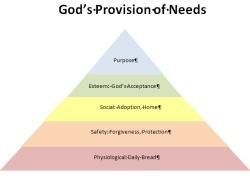When contemplating the Lord’s Prayer, it identifies what belongs to God (i.e., name, kingdom, will) and what belongs to me (i.e., daily bread, debts). The distinction is in the fact that God’s list is a statement while my list consists of two requests: daily bread and forgiveness of debt.
What does it mean for us to have our daily bread?
The best description I have heard has been for all our needs to be fulfilled. However, what are our needs? Psychologist Abraham Maslow names our basic needs in his hierarchy of needs. Maslow’s Hierarchy of Needs consists of five stages, each of which needs to be fulfilled in order to meet the next level of the pyramid.
First are physical needs (i.e., food, water, etc.). Our physical needs are provided by the nourishment, as symbolized by the Lord’s Supper.
Second are safety needs (i.e., protection environmentally, relationally). Take, for example, the crippled grandson of Saul who was invited to King David’s table, who had cast his lot as a beggar and knew he was powerless when brought before King David who would then decide his fate. Our safety needs are taken care of by God’s protection when we remain in His will.
Third is social (i.e., acceptance, belonging). Scripture says we are adopted into God’s family and heaven is our home, which takes care of the belonging portion. Social needs are provided within relationship to God.
Fourth is self-esteem (i.e., feeling good about oneself). Scripture also talks about being accepted by God through Christ, which refers to the social aspect. Our self-esteem needs are covered by God’s redemption of us through the cross.
The top tier is self-actualization. That is, we have a purpose and a calling, which correspond to the self-actualization portion of Maslow’s work. (One’s primary calling would be the call to come to God.) Self-actualization is the fulfillment of one’s potential, first by responding to the primary calling, as suggested by Os Guinness, to be the call to relationship with God; the secondary calling is the call to how one will serve God specifically, according to personality, talents, giftings, resources, etc.
Rather than leave us in need, God provides for all of our needs. Instead of living off our own abilities/power as deemed worthy of attention by other people, God invites us to His table, thereby providing nourishment and proving His forgiveness.




